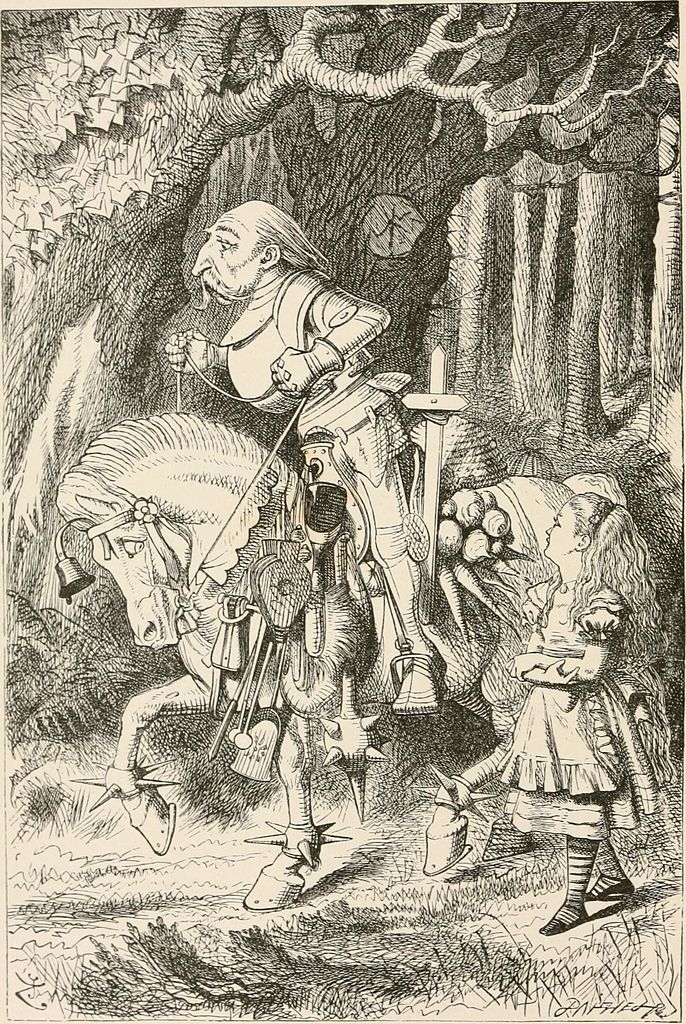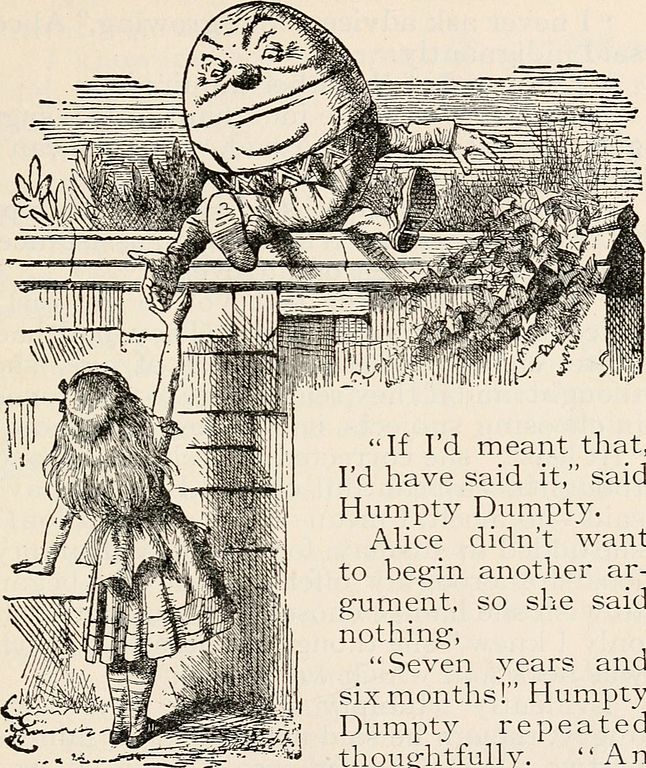
Crowley’s The Sword of Song (1904) consists mainly of two long poems, ‘Ascension Day’ and ‘Pentecost,’ both critical of Christianity; they are preceded by an Introduction and followed by lengthy notes. The title, with its subtitle and long dedication, is itself rather ironic:
THE SWORD OF SONG
CALLED BY CHRISTIANS
THE BOOK OF THE BEAST
1904
TO MY OLD FRIEND AND COMRADE IN THE ART
BHIKKHU ANANDA METTEYA
AND TO THOSE
FOOLS
WHO BY THEIR SHORT-SIGHTED STUPIDITY IN
ATTEMPTING TO BOYCOTT THIS BOOK
HAVE WITLESSLY AIDED THE
CAUSE OF TRUTH
I DEDICATE THESE MY BEST WORDS
Then there is a text about which a footnote says:
This passage is a parody on one in “Alice through the Looking-Glass.”
Although Alice’s interlocutor is here the Knight, his authoritarian talk reminds of Humpty Dumpty, especially in the following famous retort:
“When I use a word,” Humpty Dumpty said in rather a scornful tone, “it means just what I choose it to mean—neither more nor less.”
“The question is,” said Alice, “whether you can make words mean so many different things.”
“The question is,” said Humpty Dumpty, “which is to be master—that’s all.”

“YOU are sad!” the Knight said, in an anxious tone; “let me sing you a song to comfort you.”
“Is it very long?” Alice asked.
“It’s long,” said the Knight, “but it’s very very beautiful. The name of the song is called ‘The Book of the Beast.’”
“Oh ! how ugly!” cried Alice.
“Never mind,” said the mild creature. Some people call it ‘Reason in Rhyme.’”
“But which is the name of the song?” Alice said, trying not to seem too interested.
“Ah, you don’t understand,” the Knight said, looking a little vexed. “That’s what the name is called. The name really is ‘Ascension Day and Pentecost; with some Prose Essays and an Epilogue,’ just as the title is ‘The Sword of Song’ you know, just in the same way, just in the same way, just in the same way . . .”
Alice put her fingers in her ears and gave a little scream. “Oh, dear me! That’s harder than ever!” she said to herself, and then, looking determinedly intelligent : “So that’s what the song is called. I see. But what is the song?”
“You must be a perfect fool,” said the Knight, irritably. “The song is called ‘Stout Doubt; or the Agnostic’s Anthology,’ by the author of ‘Gas Manipulation,’ ‘ Solutions,’ ‘The Management of Retorts,’ and other physical works of the first order—but that’s only what it’s called, you know.”
“Well, what is the song then?” said Alice, who was by this time completely bewildered.
“If I wished to be obscure, child,” said the Knight, rather contemptuously, “I should tell you that the Name of the Title was ‘What a man of 95 ought to know,’ as endorsed by eminent divines, and that . . .” Seeing that she only began to cry, he broke off and continued in a gentler tone: “it means, my dear . . .” He stopped short, for she was taking no notice; but as her figure was bent by sobs into something very like a note of interrogation : “You want to know what it is, I suppose!” continued the Knight, in a superior, but rather offended voice.
“If you would, please, sir!”
Well, that,” pronounced the Knight, with the air of having thoroughly studied the question and reached a conclusion absolutely final and irreversible, “that, Goodness only knows. But I will sing it to you.”
Source: The Sword of Song (1904), in The Collected Works of Aleister Crowley, Volume II (1906), from the digitisation of the original on David Moews’s home page.
Previously published on Agapeta, 2018/07/21.

